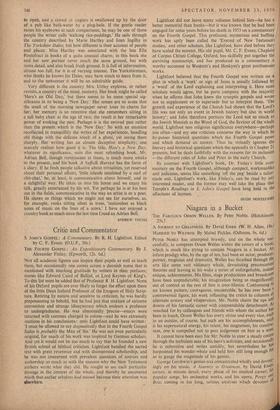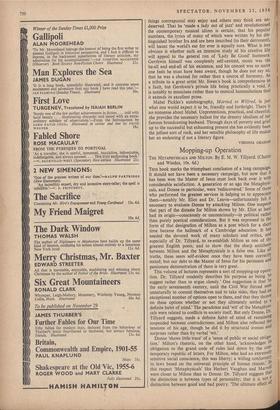Niagara in a Bucket
PETER NOBLE has attempted bravely, and on the whole suc- cessfully, to compress Orson Welles within the covers of a book, which is much like trying to contain Niagara in a bucket. An infant prodigy who, by the age of ten, had been an actor, producer, painter, magician and dramatist, Welles has thrashed through the arts like some vast visionary whale, devastating preconceived theories and leaving in his wake a series of unforgettable, indeed unique, achievements. His films, stage productions and broadcasts have been unpredictable; his imagination being as magnificently out of control as the rest of him is over-lifesize. Conforming to no known pattern, courageous, uncoercible, he has ever been 3, controversial figure, his work inflaming the critics to columns 01, alternate ecstasy and vituperation. Mr. Noble charts the ups and downs of his fantastic career with commendable detachment. As vouched for by colleagues and friends with whom the author has been in touch, Orson Welles has every virtue and every vice, each in an outsize, of course, but such are his accomplishments, such is his supernatural energy, his talent, his magnetism, his creative' ness, one is compelled not to pass judgement on him as a man' It cannot have been easy for Mr. Noble to steer a steady course through the turbulent seas of his hero's activities, and occasionally he is, reiterative and writes untidily, but, nevertheless he has harpooned his wonder-whale and held him still long enough for us to gauge the magnitude of his genius, George Gershwin's genius was concentrated wholly and devour' ingly on his music. A Journey to Greatness, by David Ewe1,14' covers, in minute detail,-every phase of his musical career; popular songs, his orchestral works, and his opera, Porgy ant Bess, coming in for long, serious analyses which devotees i things contrapuntal may enjoy and others may think are un- deserved. That he 'made a lady out of jazz' and revolutionised the contemporary musical idiom is certain; that his popular numbers, the lyrics of many of which were written by his dis- tinguished brother Ira and are here inscribed (to their detriment), will haunt the world's ear for ever is equally sure. What is less obvious is whether such an intensive study of his creative life will appeal to the general run of 'Lady Be Good' hummers. Gershwin himself was completely self-centred, music was the be-all and end-all of his existence, and his conceit was so naive one feels he must have been aware, though he does not say so, that he was a channel for rather than a source of harmony. As a tribute to a great artist Mr. Ewen's book is comprehensive to a fault, but Gershwin's private life being practically a void, it is notably to musicians rather than to musical humanitarians that it extends its excellent prose.
Mabel Pickles's autobiography, Married to Wilfred, is just what one would expect it to be, friendly and forthright. There is no nonsense about Mabel. Unpretentious, practical, and cheerful, she provides the necessary ballast for the dreamy idealism of her famous broadcasting husband. Through days of poverty and grief up to the successful but exhausting present she has evidently been the jolliest sort of rock, and her sensible philosophy of life makes her an endearing if not a literary figure.
VIRGINIA GRAHAM











































































 Previous page
Previous page